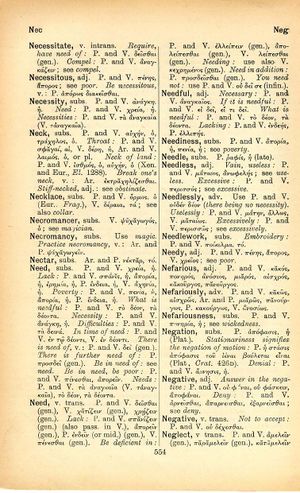negative: Difference between revisions
From LSJ
ἅπαντι δαίμων ἀνδρὶ συμπαρίσταται εὐθὺς γενομένῳ μυσταγωγὸς τοῦ βίου → a spirit assists every man from birth to be the leader of his life
m (Text replacement - "(|thumb)\n(\|link=)" to "$1$2") |
m (Woodhouse1 replacement) |
||
| Line 1: | Line 1: | ||
{{Woodhouse1 | {{Woodhouse1 | ||
|Text=[[File:woodhouse_554.jpg|thumb|link={{filepath:woodhouse_554.jpg}}]] | |Text=[[File:woodhouse_554.jpg|thumb|link={{filepath:woodhouse_554.jpg}}]] | ||
===adjective=== | |||
[[answer in the negative]]: [[prose|P.]] and [[verse|V.]] [[οὐ φάναι]], [[οὐ φάσκειν]], [[ἀποφάναι]]. | |||
[[deny]]: [[prose|P.]] and [[verse|V.]] [[ἀρνεῖσθαι]], [[ἀπαρνεῖσθαι]], [[ἐξαρνεῖσθαι]]; see [[deny]]. | |||
===verb transitive=== | |||
[[not to accept]]: [[prose|P.]] and [[verse|V.]] [[οὐ δέχομαι]], [[δέχεσθαι]]. | |||
}} | }} | ||
{{Gaffiot | {{Gaffiot | ||
Revision as of 08:56, 20 May 2020
English > Greek (Woodhouse)
adjective
answer in the negative: P. and V. οὐ φάναι, οὐ φάσκειν, ἀποφάναι.
deny: P. and V. ἀρνεῖσθαι, ἀπαρνεῖσθαι, ἐξαρνεῖσθαι; see deny.
verb transitive
not to accept: P. and V. οὐ δέχομαι, δέχεσθαι.
Latin > French (Gaffiot 2016)
nĕgātīvē, (negativus) négativement : Cassiod. Lib. litt. De rhet. arg. 3 ; Boet. Top. Cic. 5.
Latin > German (Georges)
negātīvē, Adv. (negativus), verneinend (Ggstz. affirmative), Cassiod. de dialect. p. 548 (a) ed. Garet. Boëth. in Cic. top. lib. 5. p. 359, 9 B.
Latin > English
negative ADV :: negatively; in the negative (Souter)

